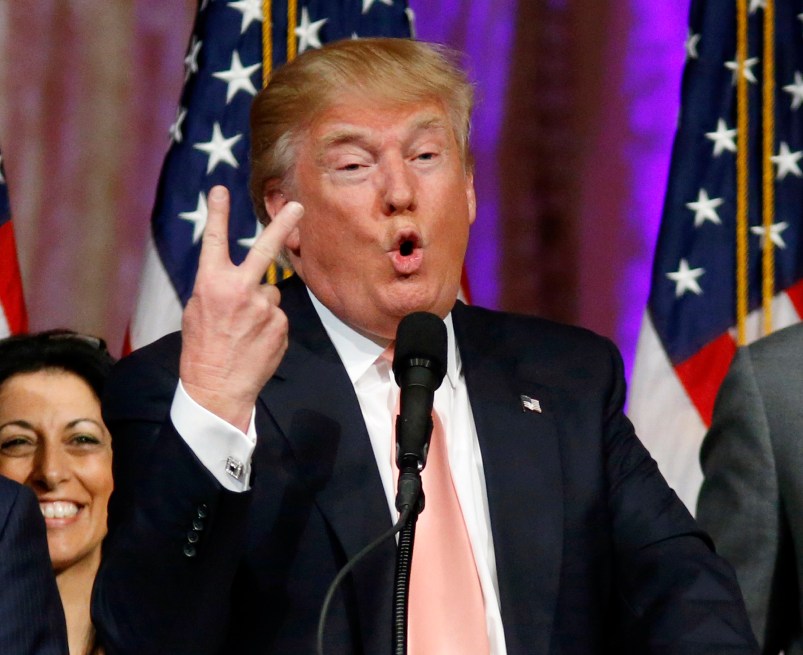As you’ve seen from our reporting, there have been a number of groups of Republicans, generally fairly sad sack, who’ve met to plot a third party candidacy on the assumption that Trump either cannot or should not be denied the nomination in Cleveland. In the nature of things almost all these embryonic efforts have proceeded on the belief that the independent candidate must be a “movement conservative.” But this exposes a key problem with the whole concept – indeed, a key driver of the crisis itself.
It would be one thing if there were a moderate or establishment independent bid (though it is a dubious proposition that the ‘establishment’ is really ‘moderate’, even in the context of the GOP politics). That would provide a very clear contrast with Trump. But if you run a ‘movement conservative’ against Trump, it gets pretty hard to see where you can find any real points of contrast on any significant issues.
So, hardline on illegal immigration? No real difference.
Hardline on terrorism, needing to say “Islamic terrorism”, creeping Sharia or any of the rest. No real difference.
Huge, huge tax cut? Same.
Obamacare terrible? Same.
Generalized opposition to ‘political correctness’? Check.
Abortion? Check.
Hating on Obama as feckless, exotic loser? Check.
The one big, big issue where there is a real disagreement is on trade. And we’ll come back to that in a moment because that is significant. But frankly, aside from that, there’s just not that much there.
Now, the phrase ‘movement conservative’ has evolved quite a lot since it was coined and had a specific meaning in the 70s and 80s. And it’s not that there are no differences. There are. Some differences on taxes. Difference on particulars of foreign policy. But they tend to be either subtle or very small fine print if your prism is how most voters think about basic issue points in a national election.
The real differences seem to be interrelated but threefold. One: Trump just isn’t a member of the club. Two: Trump is too boorish, vulgar and authoritarian even if his broad issue agenda is broadly similar to our own. Three: He didn’t used to believe this stuff. So he’s an either an opportunist or a phony.
If you’re a conservative intellectual or someone who’s very into conservatism (not just as a set of issues you believe in but a movement you participate in) each of these three points could have a lot of traction. But conservative intellectuals and what we might call (with half a wink) movement cadres only make up a tiny smattering of voters.
If you’re not in one of those categories, these points of distinction are pretty thin. What’s more it shows the pretty substantial gulf between conservative elites and the people whose votes they rely on. Does Trump’s more over-the-top line on immigration and Muslims make him more or less attractive to most Republican voters? The answer is obvious.
A similar logic applies to the one significant difference: on trade. Unfettered trade is a key orthodoxy among Republican elites and business Republicans. But it’s a very different story among Republican voters (much the same cleavage exists among Democrats).
Don’t believe me? Think I don’t understand the Republican electorate? Who cares? We’ve already tested this. We’re halfway through a national election among the country’s most conservative voters: Republican primary voters. And Trump is simply crushing the opposition. Indeed the only candidate who has been able to mount any significant challenge is Ted Cruz, whose position on most key issues is fairly difficult to distinguish from Trump’s. Indeed, when Cruz and Rubio were still fighting to be the designated ‘other choice’, one of the Cruz campaign’s rather comical but still accurate arguments was that his supporters were very similar to Trump’s. If he left the race, his supporters would go to Trump, whereas if Rubio bailed his supporters would go to Cruz.
The point is simple. ‘Movement conservatives’ can field a candidate. But other than general arguments about civility and anti-authoritarianism or just bad taste, it’s hard to know how they would be able to distinguish themselves from Trump on any significant issues. The reasons they really don’t like Trump are points of temperament and emphasis where he is likely closer to their voters than they are.






